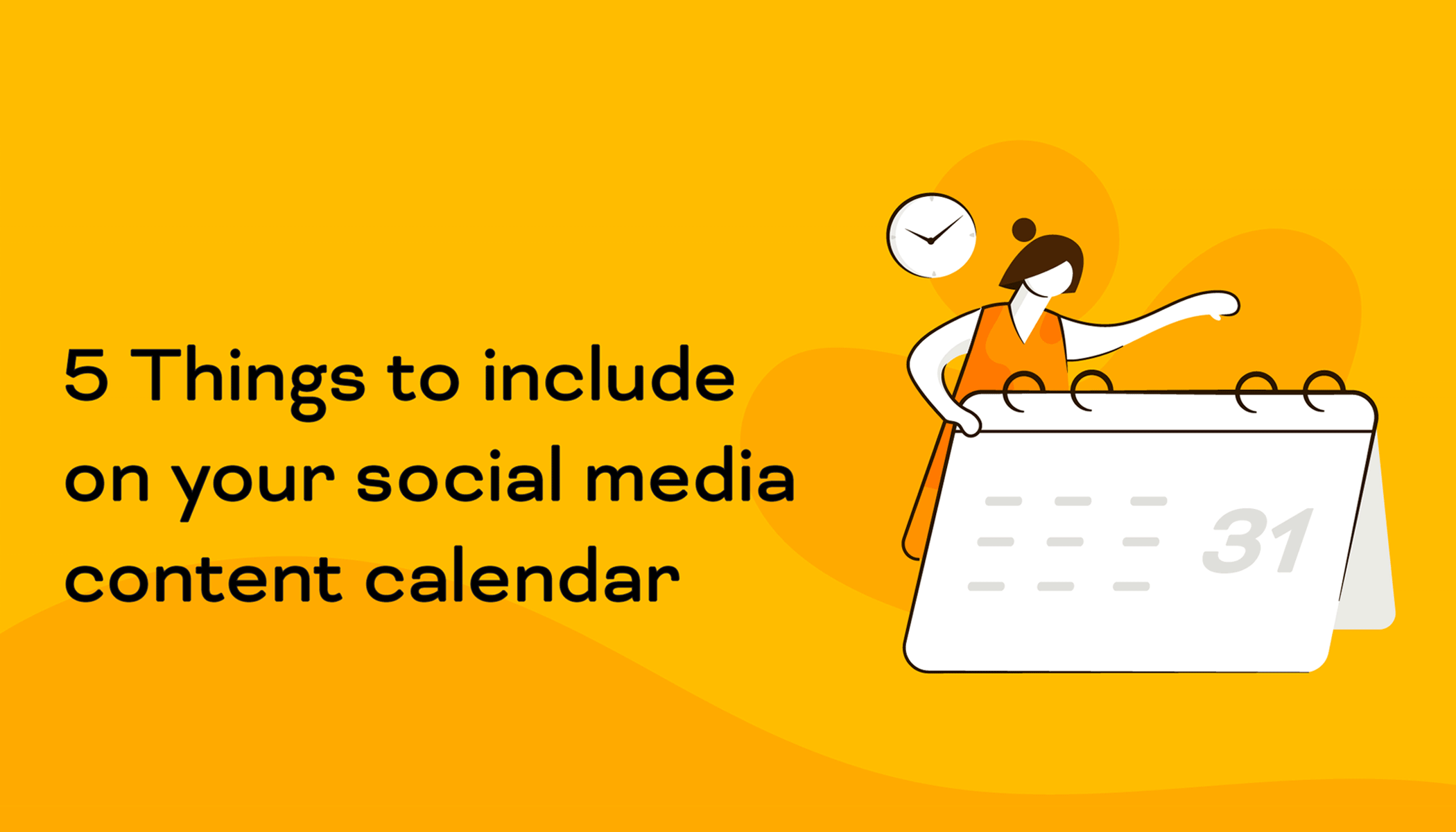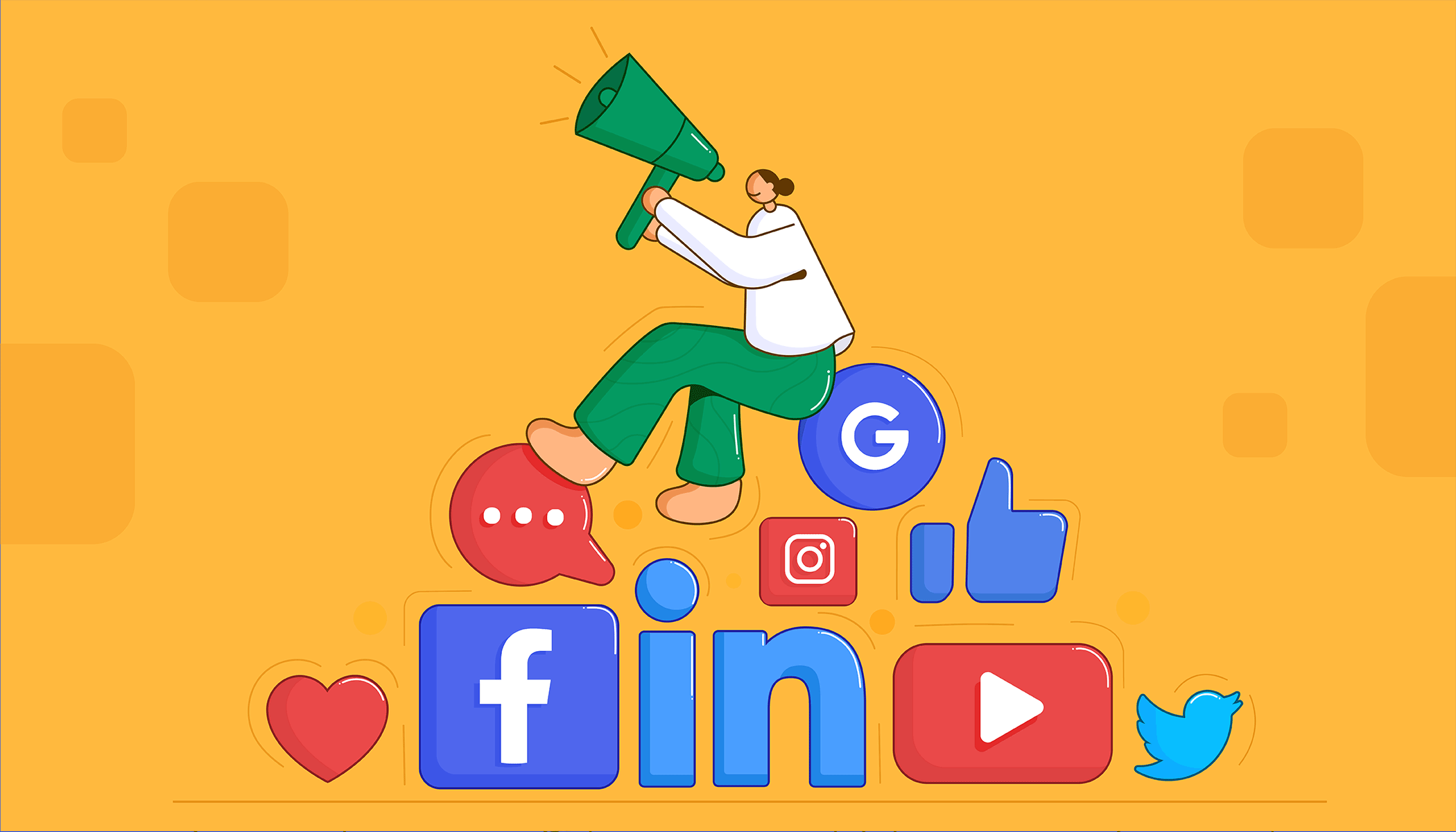How to choose the right social media platform for your business
- Last Updated : August 17, 2023
- 6.4K Views
- 11 Min Read

This is the guest post from Gaetano DiNardi, the Director of Growth Marketing at Nextiva and has a track record of success working with brands like Major League Baseball, Pipedrive, Sales Hacker and Outreach.io. Outside of marketing, Gaetano is an accomplished music producer and songwriter - he’s worked with major artists like Fat Joe, Shaggy and loves making music to stay turbocharged.

Social media is a popular form of marketing, and it’s not hard to see why. If you aren't using social media, you could be missing out on valuable opportunities to drive sales and connect with your customers. But with so many platforms and only so much time and resources, it gets tricky to determine where to focus your efforts. We’ll walk you through the most important considerations for choosing a social media platform, and which one best suit your business.
Why should you use social media marketing channels for your business?
Social media platforms can help your business with different marketing and conversion goals, such as:
Building brand awareness. Posting on social media allows your brand to stay current in people’s feeds. It increases your brand’s discoverability by making information about your products or services more accessible to anyone who’s browsing—whether they’re actively looking for your brand or casually scrolling.
Share updates. Keep people up to date with the latest happenings with your company through social media. Each time you hit a new milestone, launch a new product, win a new award, or participate in an event, you can let people know by posting about it.
Connecting with customers. Social media gives you the power to talk to your customers directly. Customers can start a dialogue with you on social media, which you can leverage to get honest feedback and build a community.
Strengthening your SEO. While social media has an indirect impact on SEO, it has an impact nonetheless. Search engines use your social media platforms to help determine your E.A.T. (expertise, authority, and trust). Brands with strong E.A.T. are more likely to rank higher in search results.
Growing your email list. You can leverage social media to grow your other market channels, like your email list. Continue sending customers further down the funnel by promoting your email list on social media.
Grow website traffic. Social media can help you get more visits to your website. You can link to relevant web pages in your posts so people can easily discover and access your site from your social channels.
Increase revenue. Social media presents many opportunities to boost sales. Some channels let you link to your products directly in each post, while others have shopping capabilities built-in.
Providing excellent customer service.35% of consumers have turned to social media to report customer service issues. You can turn wrongs into rights very quickly and easily by responding to customer questions.
Leverage social proof. 55% of customers have praised a business over social media. Ask customers for social proof via social media, or use comments they’ve left on your posts or in your direct messages as social proof on your website and other marketing materials.
How to choose the right social channels for your business
There are a ton of social media platforms to choose from, so it’s important to have your social media marketing strategy in place first. To craft this, though, you need to know the answers to a few questions. Here are some things to consider before selecting a social media platform or platforms to use for your business.
Find out who your target audience is
Different demographics hang out on different channels and media platforms. Where does your audience live or work? Is your audience on the younger side? Do they enjoy more serious or lighthearted content? Figuring this out will help you narrow down the platforms you should stick to.
Consider your overall marketing goals
Some platforms are better for building awareness and top-of-funnel initiatives, while others are better for conversion. What are you trying to achieve? You’ll want to choose the platforms that match the goals you have in mind.
Be realistic about your available resources
Social media management and content creation is an industry for a reason—it’s a lot of work! Be realistic about how much time and resources you have to give to running your channels. Do you have a dedicated employee or team to help you create and post visual content? If not, you may want to choose channels that are lower maintenance or limit the number of platforms you actively manage.
Identify the types of content you've already created
Do you have photos, short videos, or blog posts already made? Each platform has particular types of content it showcases best, so they path of least resistance might be to allow your already existing content to lead you to a platform that will allow you to share it easiest.
Research how competitors and others in your industry use social media
Competitive research will help you get a sense of which platforms are popular in your industry. Which accounts do your competitors have an active presence on? What types of posts are performing well? What kinds of comments are people leaving? You can also get a sense of the cadence, as in, how many posts per day, per week, or month does your industry typically share?
Additionally, you can also use your findings to pinpoint gaps. Are there social media sites that your competitors aren’t using? Perhaps you can start using them to get a leg up and stand out.
The best social media platforms for your business
With nearly three billion monthly active users, Facebook is still the most popular social media platform in the world. Because of its legacy status and huge user base, most companies feel obligated to make an account.
Facebook is popular among older users. That could be because seniors are the fastest-growing demographic on the platform. In actuality, Facebook’s user base is fairly evenly split among Gen Z users, Millennials, and Gen Xers.
Should I use Facebook for my business?
If your target audience is still actively using the social network, you should aim to use it as well.
Your Facebook business page can drive traffic to your website, engage with existing customers, and run advertisements to your target audience for a relatively low cost. You can also use Facebook’s Group feature to create an official group related to your products or industry.
It’s also important to note that since Facebook owns Instagram, you need to have a Facebook business account to run Instagram ads, even if you don’t intend to use Facebook actively.
Instagram remains one of the most popular social media networks worldwide, with over a billion monthly active users. Half of them are active on the platform every day, and 90% follow at least one brand account. The app is very popular with younger audiences, with roughly 62% falling in the 18-34 age bracket.
Instagram is for more than just sharing photos these days. With Instagram Stories, Reels, IGTV, and shoppable feeds, Instagram has positioned itself as both a short-form video and shopping destination. It also has a Live feature that lets you host a live video solo or with another account, making it suitable for hosting fireside chats in a more intimate setting.
Should I use Instagram for my business?
Instagram is a very visual-driven platform making it a double-edged sword. If you’re able to share visually compelling content, you’ll be able to thrive. On the other hand, if you don’t, it will be glaringly obvious if your content is not as aesthetically pleasing as the other content on the platform. If you don’t have a library of visual content or the resources to create some, you should probably put Instagram on the back-burner.
However, Instagram is a great channel for customer marketing compared to lead generation. If your existing customers are using Instagram, you can use the platform to deliver better customer service and strengthen your customer retention. For example, if you’re a small business POS software company, you can connect with the retail or hospitality business owners that use your platform through Instagram and engage with them.
Related: Taking conversations off Instagram and onto email can be difficult but may be necessary for your business. Here’s an easy-to-follow process for finding emails on Instagram and validating them with Google Sheets.
LinkedIn is more than just a professional networking site. It’s now also a hub for recruiting top talent, providing thought leadership, strengthening employer branding, and generating business leads thanks to its InMail feature.
LinkedIn has over 744 million users worldwide, and 97% of Fortune 500 companies have a presence on the platform. LinkedIn is one of the top destinations for B2B marketers—companies that advertise on the site reported seeing a 10-15% lift in short-term sales performance. Brands who use the platform are also more likely perceived as professional, respectable, and intelligent.
Should I use LinkedIn for my business?
A quick search on Google for “best B2B social media platforms” will quickly return to LinkedIn as the top social media site. That’s because LinkedIn allows you to search for, target, and then message potential customers directly for a more personalized and precise approach. On the organic content side, LinkedIn’s algorithm will help push your content to a wide network of people, boosting your brand’s discoverability.
LinkedIn is the only major social media platform that’s geared towards employer branding. Its design and focus on connecting job seekers to open roles make it a natural fit for showcasing how your company treats its employees. This makes you come across as more trustworthy and legitimate to both potential customers and employees.
Twitter content is short but still mighty. Companies can engage with customers, spark discussions, and chime in on current events with only 280 characters or less. Twitter has over 192 daily active users, 77 percent of which said they have a more positive impression of a brand when it responds to a tweet.
Should I use Twitter for my business?
Twitter is a very low-effort platform in terms of copy and design, but to make a positive impact, you’ll need to check the account frequently. The lifespan of a tweet is only 15-20 minutes, so you’ll need to be posting or retweeting often to appear in people’s feeds.
Customers also expect fast response times to complaints on Twitter. Checking your mentions or direct messages infrequently may end up hurting your brand’s reputation instead of helping it.
Pinterest is both popular and powerful. With over 450 monthly active users, it has grown to become a shopping and information destination. Over 60% of users have reported using the platform to find new ideas, products, or services they can trust. That could be you!
Pinterest is also a very top-of-funnel platform in that nearly all searches are unbranded. That means users are searching keywords without any brand name attached, so it’s extra important to understand your audience’s intent in order to optimize content effectively.
Should I use Pinterest for my business?
Pinterest isn’t widely used among B2B brands, but that doesn’t mean it can’t or shouldn’t be. When done well, Pinterest can turn into a lead-generating channel as a natural extension of your blog. Pinterest is more of a search engine than a social media platform in that people use it to search for inspiration and answers. By pinning your blog content to Pinterest and optimizing your pins for search, you’ll be able to reach people who are searching for that content directly.
If you don’t have a blog, however, Pinterest might not be the best fit. As a more top-of-funnel platform, pinning your more sales pages likely won’t resonate on the platform. Additionally, you’ll need someone to design pin graphics to use the platform effectively. If you don’t have someone who can create those assets, you might want to drop this platform.
TikTok
TikTok is one of the world’s fastest-growing apps, with over 98 million monthly active users globally on iOS devices and more than 32 million on Android. During the summer of 2021, TikTok became the first non-Facebook-owned app to reach 3 billion installs worldwide.
TikTok isn’t just for Gen Z. In fact, its U.S. user base is now almost split evenly between 20-29-year-olds, 30-39-year-olds, and 40-49-year-olds.
Should I use TikTok for my business?
One of the biggest advantages of using TikTok is that you don’t need a huge following to get a ton of views or engagement. TikTok’s algorithm is designed to show people what they’re interested in. This means you can have more trust that your videos will land in front of the right people with less effort on your part.
TikTok is also very trend-driven, so the best person to manage the account knows the latest viral videos and how to incorporate them into your marketing strategy. You don’t need to invest in fancy equipment to start creating videos, either. All you need is a phone and a basic video editing app to create content.
While it might not have the most polished or professional look, TikTok is undeniably growing rapidly and becoming a destination for discovering new products or information. If your competitors haven’t created accounts yet, being an early adopter in your space may serve you well in the long term.
YouTube
YouTube is for more than just beauty vloggers—it’s become a destination for how-to videos and product reviews for just about anything. Nearly 51% of B2B decision-makers use YouTube to research potential products and services. YouTube is also only second to Facebook for total global users, totalling just over two billion.
Although YouTube initially became popular with younger users, Boomers and Gen Xers are the fastest-growing demographics on the platform. With a range of ages represented, YouTube videos could help you reach several different audiences.
Should I use YouTube for my business?
Video content is labor-intensive, and YouTube demands a more polished look and feel than TikTok. If you decide to do YouTube, you’ll need to have video editing software on hand that can help you create professional-looking content.
That being said, like Google and Pinterest, YouTube is also a powerful search engine that can help you attract people who are searching for answers to the problems your business solves. If you optimize your videos correctly for SEO, you can connect with people who are looking for a business like yours and move them down the marketing funnel.
As with Instagram, YouTube could be better suited for customer marketing, if that’s a goal of yours. Your YouTube channel could be a fantastic place to upload more detailed product tutorials and generate hype around new feature launches.
Related: Thinking about ways to grow your audience on YouTube? Check out this podcast on Supermetrics on content strategies for YouTube as well as ways to optimize your videos for maximum engagement.
Let your goals guide your business choices
The list of social media platforms keeps growing, but you don’t have to use each one for your business. Think about where your customers spend their time online to make an informed decision. Remember, social media is time-consuming to manage, so set realistic expectations and goals for your team about how much work gets put into it and the results that come out. By aligning your goals to the right channels, you’ll have a higher chance of succeeding and having more fun!
 Ashwin
AshwinMarketer by day and writer/poet by night! I get the dopamine rush when my thoughts are put down as words or poems. A person with big time OCD (Obsessive Cinema Disorder).


